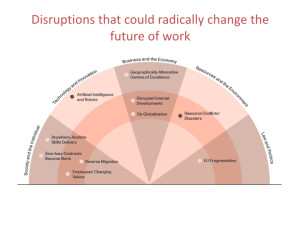Steve Wheeler has written an interesting bog post, which deserves unpacking and discussing.
Steve says:
Blended learning (in the established, traditional sense) means a mix of learning activities that involved students learning both in the classroom, and at a distance from the classroom, usually mediated through technology. I am claiming that this type of blended learning – in concept at least – is now outmoded because the boundaries between local and remote have now been substantially blurred.
I think I would largely agree with him although I am not so sure it is due to the blurring of the boundary between local and remote. Reading older papers on technology enhanced learning, there was great emphasis placed on the divide between synchronous and asynchronous communication and how to provide a proper ‘mix’ of technologies facilatating such modes. Today we flip between different modes without thinking about it. Take Skype – if I text someone they may reply straight away or may reply the next day. I may have a series of short episodic conversations with a colleague throughout the day. I may switch from text to audio or video for parts of these conversations. They may be one to one or we may invite others to participants for particular parts of the conversation. Instead of a divide between synchronous or asynchronous communication, tools now support multi modal communication and multi modal learning.
Steve goes on to say:
The new blend is to blur formal and informal learning
Of this I am less convinced. I am in a few problems here because I have often written myself about informal learning. But in truth I am unconvinced of the value of the concept. Indeed there is little agreement even on what the terms formal, informal and non-formal learning mean. If you are interested in this debate there is an excellent literature review by Colley, Hodkinson and Malcom who explore different definitions and uses of the terms. I have tended to use the idea of informal learning in two ways – to refer to learning which takes place outside the formal education system or to learning which takes place in the absence of formal teaching. The problem with the first use of the term is that it refers only to what it is not, rather than to what it is. And in the case of the second, it tends to ignore the influence of what Vykotsly called a More Knowledgeable Other. The More Knowledgeable Other is anyone who has a better understanding or a higher ability level than the learner, particularly in regards to a specific task, concept or process – a friend, a peer, a colleague, who can support the scaffolding of learning. Technology is playing a significant role in blurring boundaries here. If I read Steve Wheeler’s article, think about it and write my own ideas then surely I am learning, and in this case Steve is playing the part of the More Knowledgeable Other in guiding my thinking. Recently one of my computers was overheating. I searched for and found a web site telling me at what temperature the Northbridge chip should be running (it was running much hotter). I then found a YouTube video showing me how to take my computer apart and clean the filters. Is this formal or informal learning? Do I have scaffolding and guidance in my learning? I would suggest I do.
Even more problematic is Steve’s idea of “informal technology”. I think this may just be careless use of terminology. Of course technologies are not informal or formal. However what is certainly true is that most young people today own various technology based devices, which can be used or as John Cook calls it “appropriated” for learning. And as we move towards near ubiquitous connectivity, at least in richer countries, then these devices provide constant access to all kinds of learning – including contact to those with more knowledge than we have. It is interesting to note that most of this learning takes place in the absence of purpose built education technology, rather we appropriate applications designed for business or enterprise use or for entertainment, for learning.
I think more useful than setting a dichotomy between the formal and the informal is to explore the different relationships and contexts in which learning takes place. Last year Jenny Hughes and I made a slidecast called Critical Literacies, Pragmatics and Education as part of a Critical Literacies course being run by Rita Kop and Stephen Downes as part of their ongoing research project on Personal Learning Environments.
In this we referred to the relationships in which learning take place. These include the relationships between learners and teachers, between the learners themselves and between the learners and the wider community.
We went on to look at context. Obviously this includes place or physical context, which could be described as the learning domain. This might be a school or college, the workplace or at home. Important here is the distance between the different domains. Sometimes this distance will be short (say in the case of an apprenticeship involving workplace and school based study), but sometimes there may be a quite broad seperation between the different domains.
A second context is the social, cultural and political environment in which earning takes place. A third – and to my mind critical – context is the idea of what is legitimate learning – what is learnt and how it is learnt. Obviously this involves the idea of control.
Especially important is the context of how we recognise achievement – how outcomes are defined, what value is placed on learning, by whom and how.
We also raised the idea of discourses – the sum total of the conversations around education. In the past, we suggested, education has tended to be a top down discourse with prescribed and structured strategies for learning. This is changing and now leaners may be more likely to start from practice without a predetermined strategy for learning.
Thus relations and context or learning are becoming fluid and are contently changing. Technology is playing a major role in these changing relationships and contexts. Such a fluid discourse inevitably leads to conflict with an educational structure based on top down educational discourses.
 WONKHE reports there has been a significant rise in the number of 20 to 34-year-olds living with their parents in the UK, according to analysis of the Labour Force Survey by think tank Civitas.” The analysis, covered by the Financial Times, finds an increase of 791,600 under 35-year-olds living with their parents between 1996-8 and 2014-15. The rise has been noted in all UK regions, with the most pronounced results in London. Civitas puts the increase primarily down to the cost of housing, and suggests that HE participation could be a factor, as more young adults are financially dependent on their parents for longer.”
WONKHE reports there has been a significant rise in the number of 20 to 34-year-olds living with their parents in the UK, according to analysis of the Labour Force Survey by think tank Civitas.” The analysis, covered by the Financial Times, finds an increase of 791,600 under 35-year-olds living with their parents between 1996-8 and 2014-15. The rise has been noted in all UK regions, with the most pronounced results in London. Civitas puts the increase primarily down to the cost of housing, and suggests that HE participation could be a factor, as more young adults are financially dependent on their parents for longer.”